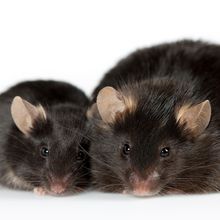Login
Subscribeimmunology, bacteria

A Bacterial Culprit for Rheumatoid Arthritis
Hannah Thomasy, PhD, Drug Discovery News | Apr 27, 2023 | 4 min read
Scientists identified a species of Subdoligranulum that may drive disease.

Gut Bacteria Help T Cells Heal Muscle: Study
Natalia Mesa, PhD | Mar 14, 2023 | 4 min read
Regulatory T cells in the colon travel to muscles to promote wound healing in mice, raising questions about how antibiotics may impact injury recovery.

Meningitis Bacteria Trigger Headaches, Then Sneak Into the Brain
Natalia Mesa, PhD | Mar 6, 2023 | 3 min read
Researchers find that bacteria stimulate a headache-causing pain pathway to suppress the immune system and infect the brain.

Mice With a Healthy Gut Microbiome Are More Motivated to Exercise
Katherine Irving | Dec 16, 2022 | 4 min read
A neural pathway between the gut and the brain led to the release of dopamine when the mice ran on a wheel or treadmill, but only in the presence of a robust microbiome.

Obesity Protects Against Genital Herpes in Mice, Study Finds
Katherine Irving | Nov 11, 2022 | 3 min read
A high-fat diet induced changes to the animals’ vaginal microbiomes that boosted survival after exposure to the virus.

How a Specific Gut Bacterium May Cause Type 1 Diabetes
Dan Robitzski | Aug 25, 2022 | 5 min read
A bacterium that produces an insulin-like peptide can give mice type 1 diabetes, and infection with the microbe seems to predict the onset of the disease in humans, a study finds.

Mapping the Neighborhoods of the Gut Microbiome
Abby Olena, PhD | Jul 1, 2022 | 7 min read
Researchers are going beyond fecal samples to understand how the patterns of commensal microbes in the gastrointestinal tract influence development and health.

Delayed T cell Response Allows Tuberculosis to Gain Foothold in Monkeys
Anna Napolitano, PhD | Jun 1, 2022 | 5 min read
The results could help guide the design of new vaccines for the disease.

Engineered Bacteria Make Tumors More T Cell-Friendly
Aparna Nathan, PhD | Apr 8, 2022 | 5 min read
Microbes designed to produce specific immunomodulatory metabolites could give immunotherapy a boost.

Antibiotics Given to Moths Spur Upregulation of Growth Genes
Devin A. Reese, PhD | Mar 1, 2022 | 2 min read
A new study has identified a molecular tradeoff between growth and immunity in moths in response to the administration of subtherapeutic doses of antibiotics, a common practice in animal husbandry.

Gut Infections Help Shield Intestinal Neurons from Future Damage
Annie Melchor | Nov 19, 2021 | 4 min read
In mice, a kind of immune memory appears to protect the cells against future harm, a finding that could provide insight into treatments for irritable bowel syndrome and other inflammatory digestive conditions.

Gut Microbiome May Help or Hinder Defenses Against SARS-CoV-2
Bianca Nogrady | Aug 31, 2021 | 7 min read
The health of the microbial community is associated with COVID-19 severity, but it’s not yet clear if the relationship is causal.

Infographic: Maternal Microbiota Has Lasting Effects on Offspring
Carolyn A. Thomson and Kathy D. McCoy | Aug 1, 2021 | 3 min read
Work in rodents shows that the bacteria living in a mother’s gut can produce immunomodulatory metabolites and influence the production of maternal antibodies—both of which can affect her offspring’s development.

The Role of Mom’s Microbes During Pregnancy
Carolyn A. Thomson and Kathy D. McCoy | Aug 1, 2021 | 10+ min read
Bacteria in the gut influence the production of antibodies and themselves secrete metabolites. In a pregnant woman, these compounds may influence immune development of her fetus.

Bacterial Infections Disrupt Flies’ Sense of Smell
Abby Olena, PhD | Jul 21, 2021 | 4 min read
The temporary loss of olfaction stops the flies from eating any more of whatever it is that made them sick.

Human Protein Dissolves Bacterial Membranes
Abby Olena, PhD | Jul 15, 2021 | 4 min read
The protein, apolipoprotein L3, destroys invading microbes by acting as a detergent in the cytosol.

Many Deep-Sea Microbes Invisible to Mammalian Immune System
Abby Olena, PhD | Mar 12, 2021 | 3 min read
In a new study, human and mouse cells recognized only one in five bacterial species collected from more than a mile below the Pacific Ocean’s surface.

Long-Lasting Wound Infections Linked to Microbes and Genetics
Lisa Winter | Sep 1, 2020 | 2 min read
Two gene variations might help explain why some people experience chronic wounds.

Host Cells Release Exosomes to Sop Up Bacterial Toxins
Rachael Moeller Gorman | Jun 1, 2020 | 3 min read
During bacterial infection, autophagy proteins appear to regulate the release of cell-saving exosomes, which bear the brunt of toxin damage.

Infographic: How Cells Use Decoys to Defend Against Pathogens
Rachael Moeller Gorman | Jun 1, 2020 | 1 min read
Specialized exosomes sop up bacterial toxins, a study finds.



